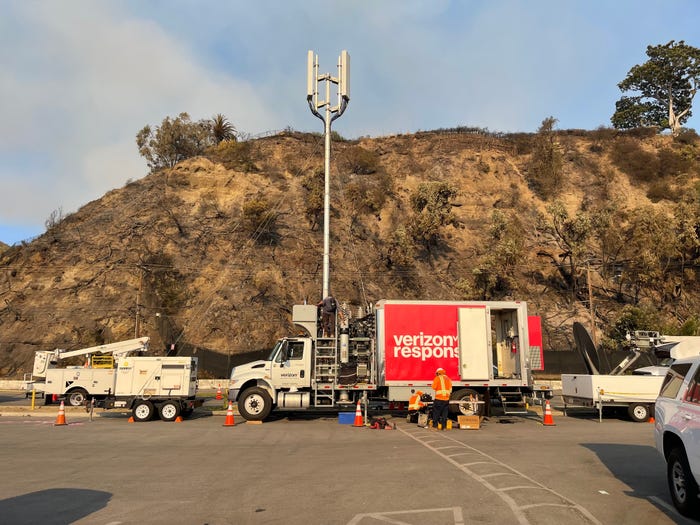CMA report proposes larger Airwave losses for Motorola Solutions, hints at ESN changesCMA report proposes larger Airwave losses for Motorola Solutions, hints at ESN changes

Motorola Solutions could lose more than $250 million annually in projected revenue for providing its Airwave TETRA service to United Kingdom (UK) first responders during the next four years, and the company could be removed from UK public-safety broadband plans, based on findings in a UK competition watchdog report released yesterday.
On Friday, the Competition and Markets Authority (CMA) released a provisional-decision summary of its market investigation of Motorola Solutions that called for the implementation of price controls that would prevent the LMR vendor giant from receiving “supernormal profits” annually of about 160 million pounds (more than $178 million).
But the CMA’s full provisional-summary report released yesterday paints an even bleaker picture for Motorola Solutions. More than 550 pages in length, the comprehensive CMA report proposes limiting Motorola Solutions’ annual revenue from Airwave to less than 200 million pounds ($224.3 million), which would be less than half of the 433.5 million pounds ($486.2 million at current exchange rates) in revenue that Airwave reported in 2020.
“We note that the size of this reduction exceeds the estimate of supernormal profits identified in our profitability analysis, because that analysis adopted a more conservative approach to the assessment of opex requirements (including, for example, in its use of Airwave Solutions’ indexation assumptions), and assumed that relevant capex would be recovered within the 2020-2026 time period),” according to a footnote in the CMA report.
Under the CMA’s proposed charge control, Motorola Solutions would have “revenue allowances” of 199 million pounds in 2023, 197 million pounds in 2024, 196 million pounds in 2025, and 194 million pounds in 2026. These figures would be adjusted to reflect an inflation index.
If the UK fails to provide a public-safety broadband alternative like its much-delayed Emergency Services Network (ESN) by the end of 2026—a distinct possibility, according to the CMA report—yet another Airwave extension would be needed. Under this scenario, Motorola Solutions’ inflation-adjusted revenue caps from Airwave service would be 192 million pounds in 2027, 189 million pounds in 2028, and 187 million pounds in 2029.
These proposed Airwave revenue figures represent a stark contrast to the 400-plus million pounds that Motorola Solutions has received from the highly profitable UK TETRA network in recent years. In both 2019 and 2020, Airwave Solutions reported pre-tax profits exceeding 191 million pounds ($213.8 million under current exchange rates).
Last week’s CMA summary includes a footnote that the Airwave contract “accounted for 7-8% of Motorola’s global revenue—but between 21% and 26% of its global pre-tax profits—in 2018, 2019 and 2020.” In many recent years, the profit from Airwave has represented the bulk of Motorola Solutions’ global profits outside of North America, according to financial sources.
Motorola Solutions declined a request from IWCE’s Urgent Communications for a new statement—noting that company is still reviewing the massive CMA provisional-decision report—but a spokesperson indicated that the company stands by its statement issued last week.
Motorola Solutions disagreed with the CMA’s financial assessment of the Airwave contract.
“Motorola Solutions entirely rejects the CMA’s unfounded and incorrect calculation of ‘excess’ profits, which is based on an arbitrary time period of the Airwave project,” according to the Motorola Solutions statement provided last week to IWCE’s Urgent Communications. “The fact is that Airwave, over its life, is a much better deal for the UK taxpayer than the Home Office originally agreed.”
Several industry sources have expressed the opinion that the CMA investigation could serve as a precursor to Motorola Solutions renegotiating its lucrative four-year extension for Airwave that is scheduled to begin on Jan. 1.
Equity analyst George Notter of Jefferies noted this possibility in a report on Motorola Solutions that was released yesterday before CMA issued its full provisional-decision report.
“We think it’s likely that MSI [Motorola Solutions] would elect to negotiate with the UK Home Office and/or the CMA,” Notter’s report states. “In our view, the most likely scenario has the company providing the UK Home Office with an Airwave price reduction. We think 50-75 million pounds/year [reduction] is reasonable.”
One of Motorola Solutions’ arguments against the CMA’s price-control proposal is that it potentially would represent a unilateral change to the existing four-year Airwave extension that the UK Home Office signed last December. Such action would set a bad precedent for the UK government as seeks to attract vendors to do business in the future, according to Motorola Solutions.
But the CMA report disputes this notion.
“We observe that the original PFI Agreement and the subsequent contracts, all envisaged the end of the operation of the Airwave Network as of late 2019 / early 2020,” the CMA provisional decision states. “The government provided no guarantees of further revenues beyond that point and—had ESN [the Emergency Services Network] been delivered and the transition between networks completed on time—there would likely have been no such further revenues for Airwave Solutions.
“In these circumstances, we do not consider that our proposed intervention to limit the prices charged during an (unforeseen) extension period, to address (only) the supernormal element of Airwave Solutions / Motorola’s profits and leaving the terms of the original contracts unchanged, would be likely to undermine trust in contracting with the UK government.”
Indeed, the reason the UK Home Office has been forced to sign multi-year Airwave extension contracts is because the proposed LTE-based Emergency Services Network (ESN) still is not ready to provide mission-critical communications to UK first responders, even though the transition from Airwave was supposed to be finished in 2019.
Motorola Solutions also is a key vendor in the ESN initiative, responsible for software services, including the all-important broadband push-to-talk solution that was supposed to supplant the Airwave TETRA push-to-talk service.
Many UK officials have noted that Motorola Solutions has a financial incentive to take actions that slow the transition to ESN, because that means that UK first responders would remain dependent longer on Airwave, which historically has been much more profitable for Motorola Solutions.
With this in mind, some observers have asked why the CMA would not require that Motorola Solutions be dropped from the ESN project. In yesterday’s lengthy provisional-decision report, the CMA questioned whether such a move would be helpful—and noted that a change in the ESN vendor lineup could happen without regulatory intervention.
“An important contextual factor here is that the contractual arrangements through which Motorola provides ESN services end in 2024 (although it has indicated its intention to terminate them earlier),” according to the CMA provisional-decision report.
Yesterday’s CMA report also outlined the reasoning behind not recommending that Motorola Solutions be required to divest Airwave, noting that such a move would only “displace” the problem to an unproven company—if a buyer for Airwave could be found under these circumstances—and not necessarily address the cost to UK taxpayers.
CMA will conduct response hearings to its provisional decision next month and is scheduled to publish its final report about its Motorola Solutions investigation in December.
This CMA market-investigation proceeding is happening at time of significant upheaval within the United Kingdom. New Prime Minister Liz Truss was named to succeed Boris Johnson—just days before the death of Queen Elizabeth—but her aggressive tax-cutting plans resulted in the value of the pound rapidly declining in world markets. Truss today resigned as prime minister.
Prior to Truss resigning, the prime minister’s cabinet already had lost two members in about six weeks. For UK public safety, the most relevant of these was yesterday’s resignation of Home Office Secretary Suella Braverman, who has been replaced by Grant Schapps—the former transport secretary who was fired from that position by Truss when she became prime minister in early September.





